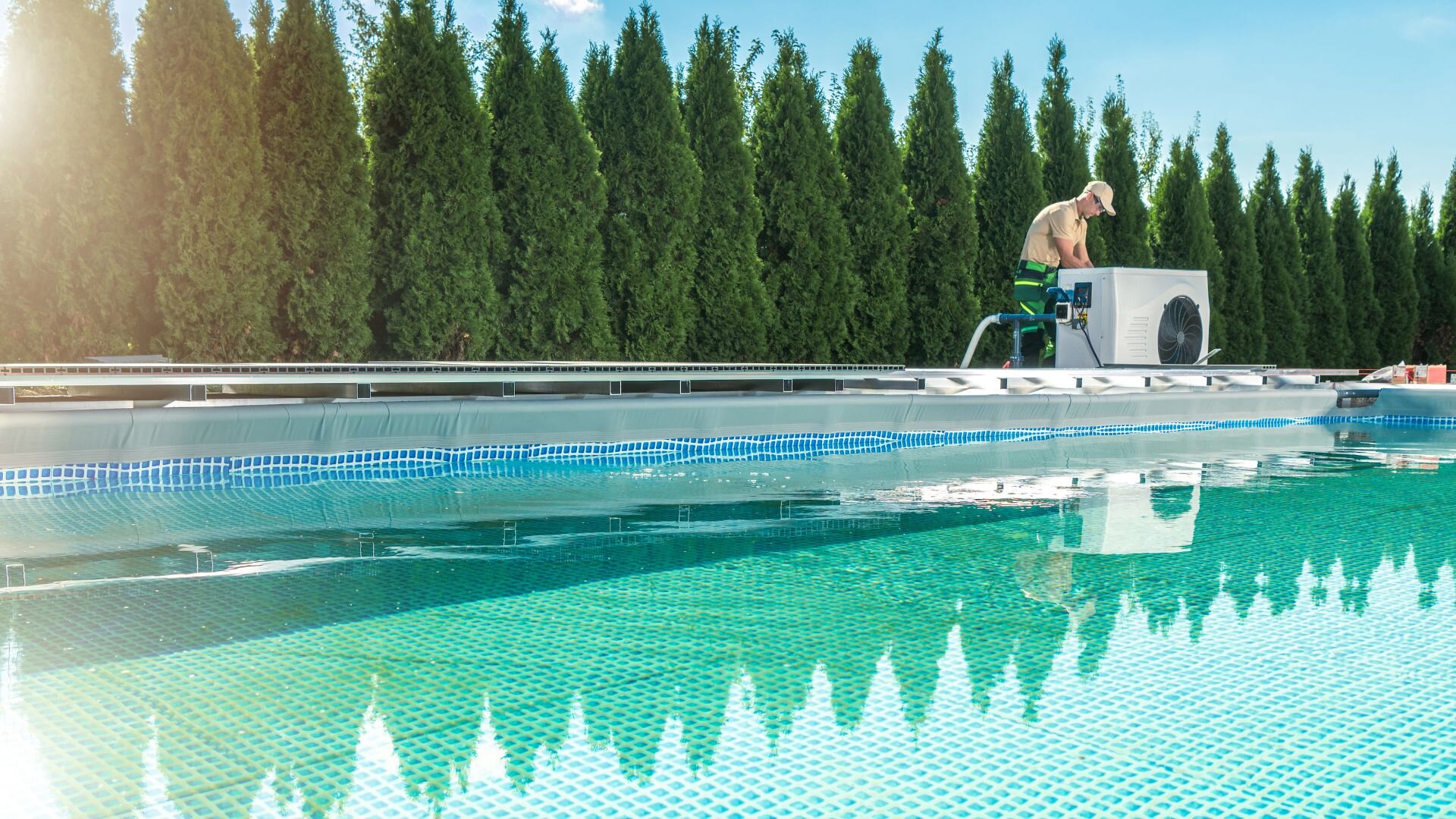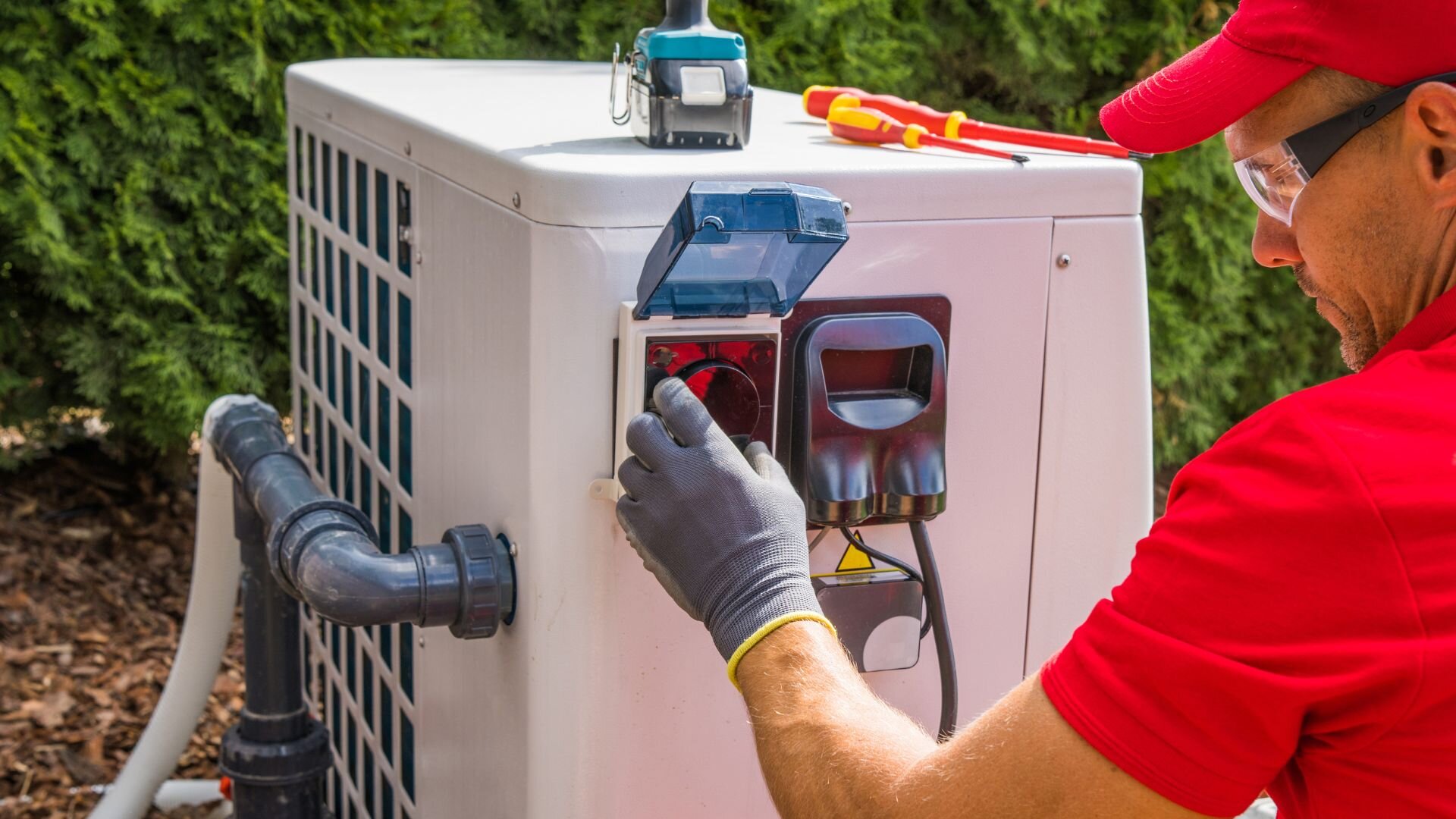Studies show that a well-maintained pool heater can operate at up to 80% efficiency. That translates to significantly reducing energy costs and a longer lifespan for your pool’s vital equipment. Whether you have a gas or electric pool heater (like a heat pump), regular maintenance is crucial for its optimal performance.
This DIY annual maintenance checklist is a valuable tool for every pool owner, but it’s important to remember it complements, not replaces, professional servicing. Think of it as your yearly pool maintenance checklist alongside your regular weekly and monthly routines.
This checklist will guide you through inspecting your pool heater, pool filter, and surrounding equipment to ensure proper water flow, drainage, and chemical levels. You’ll also check safety features like pool lights, fences, and lifeguard equipment (if applicable).
By following these steps and consulting your manufacturer’s instructions, you can maintain consistent water quality, extend the life of your pool equipment, and keep your backyard oasis a safe and enjoyable space for the whole family.
Understanding Your Pool Heater
Swimming pool owners understand the importance of maintaining a comfortable water temperature for their family and friends. Pool heaters play a crucial role in achieving this, and two common types are gas and electric pool heater systems. Gas pool heaters use either natural gas or propane to heat the pool water as it passes through a heat exchanger, while electric pool heat pumps utilise electricity to transfer heat from the surrounding air to the water.
To ensure efficient operation of your pool heater, proper water flow is essential. Pool pumps circulate the water through the heater and back into the swimming pool. Regularly checking pump baskets and pool filters for debris helps maintain proper water flow and prevents costly repairs to the pool’s plumbing. Additionally, following a pool maintenance checklist that includes daily, weekly, and monthly tasks, such as skimming floating debris and maintaining water clarity, will keep your pool equipment functioning properly.

Proper pool chemistry is another crucial factor in heater performance. Imbalanced water can lead to scale build-up in the heat exchanger, reducing its efficiency. Regularly testing and adjusting pH, alkalinity, and calcium hardness levels, as well as performing a pool shock treatment when needed, will help maintain water balance and prolong the life of your pool heater.
Safety is always a top priority for pool owners. Ensuring that pool fences, diving boards, and safety equipment meet local safety regulations is essential. Inspect pool lights and jets frequently and seek professional assistance if any issues arise. Installing a pool cover reel system helps maintain proper water temperature and adds an extra layer of safety.
By understanding the working principles of pool heaters, maintaining proper water flow and chemistry, and following a comprehensive pool maintenance checklist, swimming pool owners can enjoy a warm and inviting pool throughout the season. Remember, if you encounter any problems with your pool heaters or heat pumps, don’t hesitate to seek the help of a professional technician to keep your backyard oasis or community amenities in top shape.
Benefits of Annual Maintenance
Maintaining your pool heater is an essential aspect of pool ownership. Regular upkeep ensures that your heater operates efficiently, safely, and reliably, providing you with a comfortable swimming experience throughout the year. In this section, we’ll explore the key benefits of annual pool heater maintenance and why it should be a top priority for every pool owner.
Increased Efficiency and Lower Energy Bills
Performing annual maintenance on your swimming pool heater system is crucial for ensuring optimal performance and longevity of your pool equipment. By following a comprehensive pool maintenance checklist, you can enjoy numerous benefits that will keep your pool in top condition and your swimming experience enjoyable throughout the year.
One of the primary advantages of regular maintenance is increased efficiency and lower energy bills. A well-maintained pool heat pump operates at peak performance, consuming less energy to keep your swimming pool warm. This translates to significant savings on your monthly utility costs. Additionally, proper maintenance extends the lifespan of your heater, preventing premature wear and tear.
Reduced Risk of Breakdowns and Costly Repairs
Annual maintenance also reduces the risk of breakdowns and costly repairs. By identifying and addressing potential issues early on, you can avoid unexpected malfunctions that can leave your pool unusable. Regular inspections of the heating element, filtration system, and other critical components ensure that your pool remains in excellent working condition.
Preventing Safety Hazards
Neglecting maintenance can lead to a host of problems, such as overheating, malfunctioning components, and even safety hazards. A pool maintenance checklist helps you stay on top of essential tasks, such as checking the water balance audit, adjusting chemical levels, and maintaining water clarity. It also reminds you to inspect the pool deck, deck drains, and proper water drainage to prevent accidents and maintain a safe environment.
Enhanced Pool Enjoyment
In addition, a well-maintained pool enhances your overall swimming experience. Crystal-clear water, properly functioning pool jets, and a clean pool floor contribute to a more enjoyable and inviting atmosphere. Whether you’re swimming laps for exercise or relaxing with family and friends, a well-kept pool provides the perfect backdrop for your aquatic activities.
Daily, Weekly, and Monthly Maintenance Tasks
In addition to the weekly pool maintenance and monthly pool maintenance checklist, it’s important to perform daily pool maintenance tasks. This includes skimming the pool’s surface to remove leaves, insects, and other floating debris. Automatic pool cleaners can assist with this process, but manual attention is still necessary to ensure thorough cleaning.
Saltwater Pool Maintenance
For saltwater pool owners, proper maintenance is especially crucial. Regular monitoring of water chemistry, including calcium hardness and pH levels, is essential to prevent corrosion and maintain the longevity of your pool equipment. Utilising pool covers when the pool is not in use can also help reduce evaporation and maintain water balance.
Your Step-by-Step Guide to Annual Pool Heater Maintenance
Maintaining your pool heater is a crucial part of your annual pool maintenance checklist. A well-maintained heater ensures your swimming pool remains comfortable and inviting throughout the season. Follow these steps to keep your pool heater in top condition, whether you have a gas pool heater or an electric pool heat pump. Remember to prioritise safety by turning off the power supply and wearing protective gloves when performing maintenance tasks.

Gas Pool Heaters
- Begin by inspecting the exterior cabinet for debris, dust, and rust. Clean the cabinet thoroughly to prevent damage and maintain its appearance.
- Next, check for gas leaks around connections using a soapy water solution. If you detect any leaks, consult a professional to avoid potential hazards.
- Remove the burner assembly and clean it by removing any dust and cobwebs. This step ensures efficient heating and prevents issues with the ignition process.
- Inspect the igniter and replace it if necessary. For complex tasks, it’s best to consult a professional to ensure proper installation and functionality.
- Visually inspect the heat exchanger for signs of corrosion or damage. If you notice any issues, contact a professional for repair or replacement.
- Finally, test the heater to ensure it’s functioning correctly and efficiently. Proper maintenance will help you maintain water clarity and comfort in your pool throughout the season.
Electric Pool Heaters
- Start by cleaning the exterior cabinet of your electric pool heat pump, removing any debris and dust that may have accumulated.
- Check the electrical connections for signs of damage or corrosion. Ensure all connections are secure and free from hazards.
- If your heat pump has an air filter, clean it according to the manufacturer’s instructions. A clean filter ensures optimal performance and energy efficiency.
- Visually inspect the heating elements for signs of wear or damage. If you notice any issues, contact a professional for repair or replacement.
- Test the heater to ensure it’s functioning correctly and efficiently. Regular maintenance will help you enjoy a comfortable swimming pool all season long.
By following this annual pool heater maintenance checklist, you’ll keep your pool heater in excellent condition, ensuring your pool remains a welcoming oasis. Don’t forget to include heater maintenance as part of your weekly pool maintenance routine, alongside tasks like checking pool chemicals, cleaning the pool’s surface, and ensuring proper drainage. With consistent care and attention, you’ll enjoy a sparkling, clean pool that’s the envy of your neighbourhood health club.
When to Call a Professional

When it comes to swimming pools, proper pool maintenance is crucial to ensure a safe and enjoyable experience. While many tasks can be tackled by following daily and weekly pool maintenance checklists, some situations call for the expertise of qualified pool technicians. These professionals are equipped to handle complex issues beyond the scope of regular pool maintenance.
It’s recommended to seek professional service when identifying and repairing leaks, whether they involve gas or electrical components. Replacing intricate parts like the heat exchanger or igniter in gas heaters also warrants a qualified technician. Similarly, any electrical work on electric pool heaters should be left to the experts to ensure safety and proper functioning.
If you encounter persistent problems with water chemistry despite following pool maintenance checklists, it’s wise to consult a professional. They can diagnose and resolve issues affecting pool water quality. Additionally, if you notice any damage to the pool floor, pool deck, or safety equipment, a qualified technician can assess and repair these areas to prevent further deterioration and maintain a secure environment.
Remember, while regular pool maintenance tasks like checking the pool pump and maintaining pool covers can be done independently, it’s essential to recognise when professional assistance is necessary for the longevity and safety of your swimming pools.
We Take the Heat Off Pool Heating Maintenance
Just like your pool itself, your heating system thrives with regular care. Following these simple maintenance tips will ensure optimal performance, extend its lifespan, and keep those poolside chills away all season long.
For a truly worry-free experience, let The Pool Co. handle your pool heater maintenance. Our expert technicians service both gas and electric heaters, ensuring your system runs smoothly and efficiently. Contact The Pool Co. today and dive into hassle-free pool heating!
Frequently Asked Questions: Annual Pool Heater Maintenance
Isn’t there a separate daily or weekly pool maintenance checklist I should follow alongside the annual one?
Absolutely! While the annual checklist focuses on keeping your pool heater in tip-top shape, daily and weekly maintenance ensures your pool water stays sparkling and your entire pool system runs smoothly. A daily pool maintenance checklist should include skimming debris with your net, checking the pool water level to make sure it’s within the recommended range, and testing the free chlorine and pH levels using a pool test kit. Weekly tasks might involve brushing the pool walls with a pool brush, cleaning the filter basket in your skimmer box, and topping off any pool chemicals like chlorine or algaecide as needed.
Do I need to adjust the chemical levels in the pool water as part of the annual heater maintenance?
While the annual check-up isn’t the only time to focus on pool water chemistry, it’s a good idea to ensure your heater isn’t working overtime due to imbalances. Proper pool water chemistry is essential for heater efficiency and overall pool health. Schedule a professional pool service or invest in a good pool test kit to stay on top of your water chemistry throughout the year. This will help you maintain a healthy balance and avoid potential problems.
Should I check the deck drains during the annual pool heater maintenance?
While not directly related to the heater itself, checking your deck drains is a wise move during any pool maintenance, including the annual service. Clogged deck drains can lead to pool water overflowing and potentially damaging your pool heater or other pool equipment. Ensure proper drainage around your pool by checking the deck drains to avoid these issues. This will help prevent headaches and costly repairs down the track.



